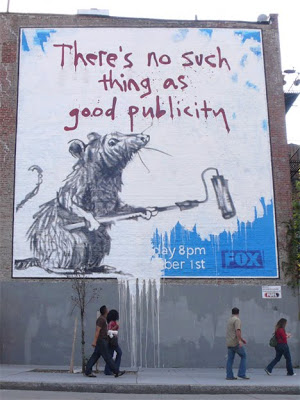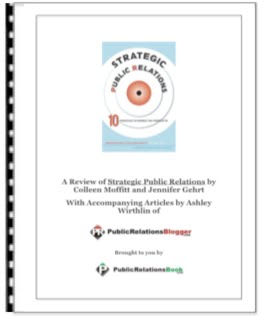Showing posts with label Any Publicity is Good Publicity. Show all posts
Showing posts with label Any Publicity is Good Publicity. Show all posts
________________________________________________________________________
 False. (I also think the image is false, but it makes a point.) Public relations of the negative variety can be destructive, brand tarnishing, and irreversible. As can be seen in recent developments with a little company known as BP, any PR is definitely not good PR.
False. (I also think the image is false, but it makes a point.) Public relations of the negative variety can be destructive, brand tarnishing, and irreversible. As can be seen in recent developments with a little company known as BP, any PR is definitely not good PR.
Now, I suppose this myth could hold some truth if you (as a company, brand, person, etc.) are not concerned with people liking you, buying your products or services, or advocating you to others. If you are concerned with those things, not all PR is good PR (and I assume you're in this latter category because you're here).
As I mentioned in a recent post, negative PR can spread far and wide (and quickly, for that matter) with the new and improved methods of communication the internet provides. Everyone and anyone can be an advocate for your brand, or an opponent. This negative PR makes the public relations team work harder to not only preserve a brand but to also anticipate and try to diffuse a crisis online.
This is precisely the reason that not all PR is good PR. The reason for this myth being true in the past was that, despite the information going around being negative, people were still aware of you. (If awareness was all that mattered, we'd all be PR pros.) In order to generate interest in your company, to create buyers and loyal customers, your PR has to be positive. Negative PR may get people to your site, but it won't make them jump on board with whatever you're selling (product, idea, or otherwise).
Public Relations may differ from sales or marketing in a few ways, but the main reason may be that PR is concerned with the end result of the entire campaign. If the end result is not positive, though you may have had marginal success in some of the tactics employed throughout the plan, the campaign was not successful. The end result needs to be positive and successful. (To gauge that success, be sure to create benchmarks to set your plan's results against.)
So, how do you ensure that most PR is good PR for you and your company? Take responsibility, and act. (It's all the way you react and respond to a crisis.) If you see some negative PR buzzing around cyberspace, do something about it. Can you remedy the situation by offering an opposing thought? Can you change the minds of the negative WOM (word of mouth) spreaders by sharing information/facts/data? Can you offer a solution to an unhappy customer? I'm sure you can do all of the above.
The most important thing to do, however, is that first step aforementioned: take responsibility. No one cares if it's not your fault; if the media is building you up to be the big bad wolf, that's what you'll be. Apologize regardless of ownership of the problem, and get to work on telling of and creating a solution.
What do you think, is any PR good PR? They're talking about you at least, right?
Public Relations Myths | Any PR is Good PR
________________________________________
 False. (I also think the image is false, but it makes a point.) Public relations of the negative variety can be destructive, brand tarnishing, and irreversible. As can be seen in recent developments with a little company known as BP, any PR is definitely not good PR.
False. (I also think the image is false, but it makes a point.) Public relations of the negative variety can be destructive, brand tarnishing, and irreversible. As can be seen in recent developments with a little company known as BP, any PR is definitely not good PR.Now, I suppose this myth could hold some truth if you (as a company, brand, person, etc.) are not concerned with people liking you, buying your products or services, or advocating you to others. If you are concerned with those things, not all PR is good PR (and I assume you're in this latter category because you're here).
As I mentioned in a recent post, negative PR can spread far and wide (and quickly, for that matter) with the new and improved methods of communication the internet provides. Everyone and anyone can be an advocate for your brand, or an opponent. This negative PR makes the public relations team work harder to not only preserve a brand but to also anticipate and try to diffuse a crisis online.
This is precisely the reason that not all PR is good PR. The reason for this myth being true in the past was that, despite the information going around being negative, people were still aware of you. (If awareness was all that mattered, we'd all be PR pros.) In order to generate interest in your company, to create buyers and loyal customers, your PR has to be positive. Negative PR may get people to your site, but it won't make them jump on board with whatever you're selling (product, idea, or otherwise).
Public Relations may differ from sales or marketing in a few ways, but the main reason may be that PR is concerned with the end result of the entire campaign. If the end result is not positive, though you may have had marginal success in some of the tactics employed throughout the plan, the campaign was not successful. The end result needs to be positive and successful. (To gauge that success, be sure to create benchmarks to set your plan's results against.)
So, how do you ensure that most PR is good PR for you and your company? Take responsibility, and act. (It's all the way you react and respond to a crisis.) If you see some negative PR buzzing around cyberspace, do something about it. Can you remedy the situation by offering an opposing thought? Can you change the minds of the negative WOM (word of mouth) spreaders by sharing information/facts/data? Can you offer a solution to an unhappy customer? I'm sure you can do all of the above.
The most important thing to do, however, is that first step aforementioned: take responsibility. No one cares if it's not your fault; if the media is building you up to be the big bad wolf, that's what you'll be. Apologize regardless of ownership of the problem, and get to work on telling of and creating a solution.
What do you think, is any PR good PR? They're talking about you at least, right?
Popular choices
- Non Gamstop Casino
- Mejores Salas De Póker
- Casino Non Aams
- Non Gamstop Casinos
- Siti Casino Online Non Aams
- Migliori Siti Casino Online
- UK Online Casinos Not On Gamstop
- Meilleur Casino En Ligne Live
- Non Gamstop Casino Sites UK
- Non Gamstop Casino Sites UK
- UK Casino Not On Gamstop
- Casinos Not On Gamstop
- Online Casino
- オンラインカジノ
- UK Casino Not On Gamstop
- UK Casino Not On Gamstop
- Reputable Non Gamstop Casinos
- Casinos Not On Gamstop
- Best Non Gamstop Casinos
- Non Gamstop Casino
- Casinos Not On Gamstop
- Slots Not On Gamstop
- Non Gamstop Casino
- Casino Non Aams
- Casinos Not On Gamstop
- Betting Sites Not On Gamstop
- Casino Online Italia
- Casino En Ligne
- Casino En Ligne Belgique
- Siti Scommesse Bitcoin
- KYC 인증 없는 카지노
- Sites De Paris Sportif Fiables
- Casino En Ligne France
- Casino Non Aams Prelievo Immediato
- Meilleur Casino En Ligne Belgique
- Meilleur Casino En Ligne 2026
- Meilleur Casino En Ligne
- Casino En Ligne 2026
- Casino En Ligne France
Subscribe to:
Posts (Atom)





